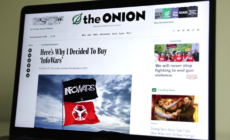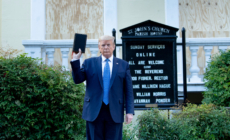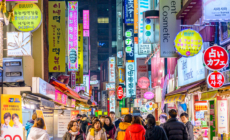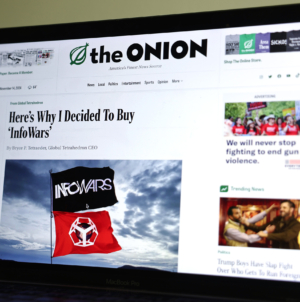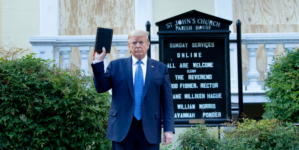-
Why Blocking The Onion From Buying Infowars Was ‘Right Decision’—Attorney - 5 mins ago
-
European Central Bank Cuts Interest Rates as the Economy Weakens - 14 mins ago
-
Two arrested in ‘pig butchering’ that cost San José man $170,000 - 33 mins ago
-
Churches Will No Longer Provide Sanctuary for Migrants Under Trump - 40 mins ago
-
How America Turned Allies into Enemies in Afghanistan - 59 mins ago
-
What sleeping in prison is like: Moldy beds, bright lights, 24/7 noise - about 1 hour ago
-
Mystery Thrifted Items Spark Theories Online: ‘Quest for Answers’ - about 1 hour ago
-
The Resurrection of Trump’s Support for Pete Hegseth - 2 hours ago
-
Woman Orders Flowers for Sister in Hospital—Hysterics Over What Arrives - 2 hours ago
-
Winds drop, chance of rain as fire danger ebbs in Los Angeles - 2 hours ago
As book bans soar, schools, libraries buy fewer books on LGBTQ+, race
After years of culture war battles in school and public libraries, the campaign by conservative-leaning “parent rights” groups has succeeded in casting a nationwide chill over the market for children’s books they deem inappropriate, greatly diminishing sales and opportunities for authors to promote their work.
During the 2023-24 school year, there were more than 10,000 book bans in public schools — a 200% rise over the previous year. The books overwhelmingly included LGBTQ+ themes and characters of color, according to PEN America. Many of the same books are banned over and over across the country, through coordinated efforts by groups that share lists of titles among their members, including picture and board books for preschool children.
In what some in the book publishing industry call “shadow bans” or “soft censorship,” the effects are far-reaching:
- Teachers and librarians, facing threats and fearful of losing their jobs or even going to jail in states that have passed laws criminalizing certain works, are hesitating to put controversial books that include LGBTQ+ characters or discussions of racism on their shelves.
- Publishers — which depend on schools and library purchases — report that sales of such books are down significantly, even when the works receive critical acclaim.
- And authors have seen school visits canceled, leaving them without a crucial income stream.
Engage with our community-funded journalism as we delve into child care, transitional kindergarten, health and other issues affecting children from birth through age 5.
“Teachers and librarians have to really weigh whether it’s worth the risk,” said Lee Wind, chief content officer for the Independent Book Publishers Assn.
Of the 23 picture books banned in at least two districts in the 2023-24 school year, 14 included LGBTQ+ characters and 17 had characters of color, with some books falling into multiple categories, PEN America said.
1

2

3

4

1. “Sparkle Boy,” by Leslea Newman, illustrated by Maria Mola and published by Lee & Low Books. 2. “Milo Imagines the World,” by Newbery Medal-winning author Matt de la Pena and Caldecott Honor-winning illustrator Christian Robinson. 3. “Heather Has Two Mommies,” by Leslea Newman and illustrated by Laura Cornell. 4. “Separate Is Never Equal,” by Duncan Tonatiuh, winner of the Pura Belpre Award. (Christina House / Los Angeles Times)
The No. 1 most banned picture book, “And Tango Makes Three,” by Justin Richardson and Peter Parnell, tells the true story of two male penguins at the Central Park Zoo who raise a chick together. “The Family Book” by Todd Parr — tied for second place — has one page illustrating the line, “Some families have two moms or two dads.”
“In the Night Kitchen,” by award-winning children’s author Maurice Sendak, who died in 2012, was also banned multiple times last year and deemed “pornographic” because the main character, Mickey, is depicted without clothes as he helps a trio of bakers find milk for the morning cake. “Draw Me a Star,” by beloved author-illustrator Eric Carle, who died in 2021, was banned for including an illustration of a naked Adam and Eve.
A childen’s division of Penguin Random House called Kokila, which is dedicated to publishing stories that have traditionally been marginalized, has seen one-quarter of its books banned. They include “Hair Love” by Matthew A. Cherry, a picture book about a Black father who teaches his child to love her hair.
”I think there is an understanding, even from people who are banning books, that these are the books that shape you and can change you,” said Namrata Tripathi, president and founder of Kokila. “It reinforces my belief that a lot of people understand how meaningful this form is.”
In many ways, those who challenge books agree with Tripathi about the power of a children’s book. They say the rising number of bans and dwindling book sales show just how deeply their campaigns resonate with parents.
“I absolutely think it’s a success that those folks aren’t seeing as high of sales as they might have been before the awareness happened,” said Madison Miner, chair of Moms for Liberty’s Orange County chapter. “You don’t have to be a Democrat or Republican to believe that parents have the right to protect their own kids. I think that’s a pretty universal stance.”
‘Don’t give us anything controversial.’

Banned children’s books are photographed on Dec. 6, 2024.
(Christina House / Los Angeles Times)
Librarians and teachers are trained to select materials for certain age groups and curriculum. But in recent years, the process has become fraught with fear and actual risk.
In at least eight states, including Indiana, Missouri and Montana, librarians and school employees now face criminal prosecution with punishments that can include jail time and thousands of dollars in fines, according to the library advocacy group EveryLibrary.
The group has identified 128 additional state bills throughout the country that would restrict access to certain materials, limit funding or otherwise harm libraries.
A new, Republican administration could mean legislation on a federal level as well. The introduction to Project 2025 — the Heritage Foundation’s proposed plans for the incoming Trump administration — equates “the omnipresent propagation of transgender ideology and sexualization of children” with pornography. “The people who produce and distribute it should be imprisoned. Educators and public librarians who purvey it should be classed as registered sex offenders.”
Generally, state laws don’t specify which material might be “harmful,” leaving many educators to err on the side of caution.
“Teachers fear for their jobs,” said Ann David, chair of the National Council of Teachers of English’s Committee Against Censorship. They “make a very reasoned decision to pull back on books they might otherwise teach in their classrooms.”
The California campaign
When Miner’s oldest son was in kindergarten, “he came bouncing home one day saying, ‘Mommies can marry mommies, and daddies can marry daddies!’ ” She knew he hadn’t learned this at home, but she couldn’t imagine that a book about sexual orientation could possibly be part of a kindergarten curriculum. But she soon learned that there were picture books in school libraries about gay pride parades and same-sex parents.


“The Family Book,” by Todd Parr, from Little, Brown Books for Young Readers. (Christina House / Los Angeles Times)
“It was frustrating as a parent to feel like that’s a conversation that was stripped from me,” said Miner, who has four children. “These are books that are just so inappropriate for a school setting. It’s not a school’s responsibility to educate a kid on sexuality and gender preference.”
Miner served on the Orange Unified School District board but was recalled in March after spearheading policies opposed by LGBTQ+ advocates, including a policy that required schools to notify parents if their child identified as transgender. The board also directed the district to suspend their digital library app after some parents complained that it contained books that were inappropriate for young children.
Miner restarted the Orange County chapter of Moms for Liberty in July to teach parents how to work with their local school boards to have content removed. She said it’s “heart-wrenching” to hear from parents who are unhappy with a school librarian’s selection of books “but feel like they are walking on eggshells because they didn’t want to cause rifts.”
Brenda Lebsack, a special education PE teacher who recently was elected to the Santa Ana Unified School District board, campaigned against allowing books in schools that sexualize children and suggest gender is fluid. Books in kindergarten, she said, teach kids that “their gender and pronouns can change like the weather based on their feelings.”
“When I read this as a 59-year-old adult, I’m questioning. I’m confused. So what does it do to a 4-, 5-, 6-year-old child?“ said Lebsack. “What we’re doing to kids is creating a mental health crisis.”
A 2022 Washington Post-KFF poll found that 77% of Americans think it’s inappropriate for teachers to discuss trans identity in public schools with students in kindergarten through third grade.
But a Knight Foundation survey conducted this year found that despite those beliefs, two-thirds of Americans oppose efforts to restrict books in public school. Book challenges and bans often stem from the complaints of a few people who present their school district with a list of books that they want removed.
“I will never deny a Moms for Liberty member the right to express their view about the literature that we publish,” said Dan Novack, attorney at Penguin Random House. They can always go to their child’s teacher or librarian and ask for an accommodation for a book they’re uncomfortable with, he said. However, “they’re playing free-roaming monitor and blocking everyone else’s kids from accessing it.”
Nine states have passed laws to shield schools and libraries against censorship, according to EveryLibrary — including one in New Jersey passed this week. California passed a law allowing the state to fine schools that ban books portraying LGBTQ+ people and other historically marginalized groups, and another prohibiting libraries from banning such books.
Still, “librarians and library staff are struggling. There’s a lot of anxiety and fear,” said California Library Assn. President Genesis Hansen. The theme of the group’s most recent conference was “self-care and shelf care” to address their mounting concerns.
At the Los Feliz branch of Los Angeles Public Library, children’s librarian Diane Garcia said she has been intimidated several times by a patron who was furious about the LGBTQ+ picture books on display. And since 2022, the librarians have been finding controversial books shoved under bookshelves, hidden in the wrong sections, or even damaged.
Even in a library system such as L.A.‘s that’s supportive of diverse materials, Garcia said she sometimes feels afraid. “It’s a safety issue because its a public space, and we don’t know who’s going to come in and what they’re going to have,” she said. “It does make you look at the exits more and have a plan if something like that happens.”
Booksellers have also noticed the shift.
Linda Sherman-Nurick, owner of Cellar Door Bookstore in Riverside, said teachers and librarians have a new request: “Don’t give us anything controversial.” And she’s heard from several teachers that challenged books have been taken off the shelves of their school library.

Maureen Palacios reads to children Nov. 27, 2024, at her Montrose bookstore Once Upon a Time, which opened in 1966.
(Jason Armond / Los Angeles Times)
Once Upon a Time Bookstore in Montrose opened in 1966, making it among the oldest children’s bookstores in the country. In recent years, owner Maureen Palacios said, some schools have hesitated to purchase certain books — especially those with LGBTQ+ themes. And when Palacios writes them to schedule an author visit, some schools are now requesting that the authors leave behind any books they’ve written about LGBTQ+ characters.
Or they simply decline the visit, telling her, “This is just not going to work at this time.”
Children’s book writer Kyle Lukoff has written several popular books about transgender children, including “When Aidan Became A Brother,” one of the most commonly banned picture books during the 2023-24 school year, according to PEN America. He’s also the winner of several of the most important children’s book awards, including a Newbery Honor.
At this point in a career, Lukoff said an author usually has no problem booking school and library visits to present their books to excited young readers. He has struggled recently to fill his calendar — and several schools have canceled already-booked visits.
“School visits make up the bulk of my income,” said Lukoff, who is a transgender man and former school librarian. “I’m very concerned that a sharp decrease in school visits will impact my ability to survive as a full-time author.”
A pendulum swing for diverse books
Over the last five years, the number of racially diverse children’s books received annually by the Cooperative Children’s Book Center at the University of Wisconsin-Madison has soared. The center is sent thousands of new books each year from publishers. Books by Black and Indigenous authors and illustrators more than doubled, and books by Asian and Latino writers and illustrators increased by more than 50%. And books about LGBTQ+ individuals increased by 75%.
Independent publisher Levine Querido launched in the summer of 2020, in the midst of protests over the murder of George Floyd by a Minneapolis police officer. Headed by veteran publisher Arthur Levine, Levine Querido focused on publishing underrepresented voices and books in translation. Sales of diverse titles were strong, and three have won Newbery honors.
One year after their launch, the backlash to diversity initiatives began. Sales plunged.

Palacios points out several books that some people would like to see banned. She owns Once Upon a Time, one of the country’s oldest children’s bookstore, in Montrose.
(Jason Armond / Los Angeles Times)
“Whenever the pendulum swings in one direction, you can bet it’s going to swing back,” said Levine Querido marketing director Antonio Cerna. For example, Jyoti Rajan Gopal’s “Desert Queen,” a picture book about a young drag performer in India, won the Stonewall Book Award for LGBTQ+ books. But sales never took off. “Something Great,” by Jeanette Bradley, a book about a nonbinary child who invents a toy, also struggled.
By 2023, Levine Querido’s total sales were down 50%. The company was saved by an auction and outside investors.
Levine, who has worked in book publishing for four decades, said past book bans used to have “such a negligible effect on the success of a book that we used to welcome them” for the free publicity. But recent bans, Levine said, are a much more coordinated political campaign that often spreads across school systems and states.
“Does that mean I won’t make that book? No, I will still make that book as long as I can. But if I’m put out of business — as I very nearly have been — then I won’t make those books anymore. And that will be the ultimate effect of book banning.”
Larger publishers such as Penguin Random House also report that book sales of diverse books — especially newer titles — have decreased due to longer vetting and approval processes that can take up to six months, said Dominique Cimina, a member of Penguin Random House’s Intellectual Freedom Task Force.
In some parts of the country, schools have simply stopped buying books altogether, said Benjamin Conn, president of the Educational Book and Media Assn., which represents the distributors and publishers that sell about 90% of all books to schools and libraries.
Some districts have purchased boxes of books and then left them sitting in a warehouse, unopened, because they’re so nervous. In Texas, six teachers at one elementary school decided to keep their classroom libraries boxed up this year to avoid putting out any controversial books, said David of the National Council of Teachers of English.
Protecting challenged books
Eighteen states — including California — already have or are considering legislation to protect schools and libraries against censorship, according to EveryLibrary. And several organizations are working to fight back against book bans and the larger effects on the publishing industry.
We Are Stronger Than Censorship, for example, purchases two copies for every book that is challenged, and donates to the communities that need them. We Need Diverse Books seeks to diversify the publishing industry, including mentoring creators and providing books to classrooms.
Countering the effects of the chill will probably require a more widespread movement of support for the books being challenged. “People have to be as vocal and organized as the conservative right,” said Levine, who advises supporters to attend the same school board meetings and say, “I demand my child have access to books that reflect our family and other viewpoints.”
But parents who campaign to challenge certain books are confident that the country is shifting in their direction.
“I truly have hope that with this new presidency, something will happen that will protect our future generations in schools,” said Miner of Moms for Liberty. “We need the help.”
This article is part of The Times’ early childhood education initiative, focusing on the learning and development of California children from birth to age 5. For more information about the initiative and its philanthropic funders, go to latimes.com/earlyed.
Source link


